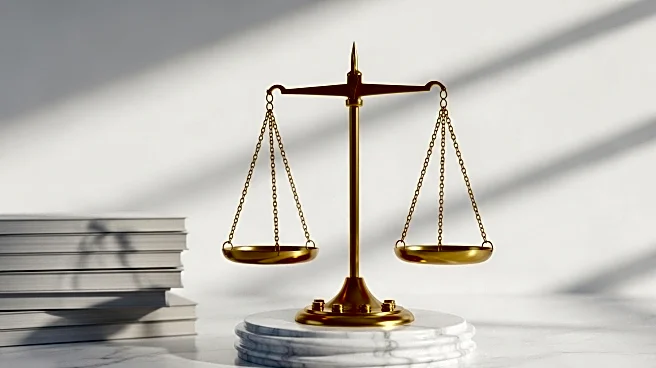What's Happening?
The Senate has confirmed Stanley Woodward as the Justice Department's associate attorney general, ending a prolonged stalemate over nominations. Woodward, previously a defense attorney for several high-profile figures associated with President Trump, will now oversee the department's civil, antitrust, and civil rights divisions. Alongside Woodward, Patrick Davis was confirmed as the head of legislative affairs, and 16 U.S. attorneys were appointed for districts including Memphis, Philadelphia, and Cleveland. The confirmations were achieved through a 51-47 party-line vote, which also approved over 100 White House nominees, reinforcing the presence of politically appointed leadership within the DOJ.
Why It's Important?
The confirmation of Stanley Woodward and other nominees marks a significant shift in the Justice Department's leadership, aligning it more closely with President Trump's influence. This development could impact the DOJ's approach to civil rights, antitrust issues, and legislative affairs, potentially altering the balance of power within the department. The expedited confirmation process, facilitated by changes in Senate voting rules, underscores the political dynamics at play and may affect future legislative interactions between the DOJ and Capitol Hill.
What's Next?
With the new leadership in place, the Justice Department is expected to advance its agenda under the guidance of Attorney General Pam Bondi and her team. The department's interactions with Congress, particularly on contentious issues, may become more streamlined under Patrick Davis's direction. Stakeholders, including civil rights groups and antitrust watchdogs, will likely monitor the DOJ's actions closely, anticipating shifts in policy and enforcement priorities.
Beyond the Headlines
The Senate's decision to alter voting rules for nominee confirmations highlights the increasing polarization in U.S. politics. This move may set a precedent for future nominations, potentially leading to more streamlined but contentious confirmation processes. The implications for the DOJ's independence and its role in upholding justice and civil rights could be profound, affecting public trust and the department's long-term credibility.









